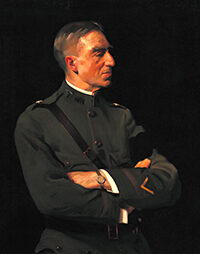William S. Thayer Collection

William S. Thayer
by Leopold Seyffert
Collection Overview
Creator: Thayer, William Sydney (1864-1932)
Collection Date: 1891-1933
Extent: 2.5 linear feer
Biography
William S. Thayer was born in Milton, Massachusetts. He received his B.A. in 1885 and his M.D. in 1889, both from Harvard University. After a year of study at the universities of Berlin and Vienna, he came to the Johns Hopkins Hospital for his residency. Thayer joined the faculty of the Johns Hopkins University School of Medicine in 1896 as an associate professor of medicine and served as head of the Johns Hopkins Hospital medical clinic from 1898 until 1905, when he became professor of clinical medicine. In 1917, Thayer was offered the directorship of the department of medicine, but because of his distinguished service as chief medical consultant to the American Expeditionary Forces in France, his appointment was delayed until 1919. Upon his retirement in 1921 he was named professor emeritus. Thayer’s research interests included a number of infectious and cardiovascular diseases, especially bacterial endocarditis. His academic contributions include organizing the first course in clinical microscopy for the medical school.
Scope and Content
The William S. Thayer Collection spans his entire career at Johns Hopkins. It consists of correspondence, drafts of Thayer’s talks, and some of his poetry. In addition, there are 5 volumes of his reprints from 1894 to 1932. Thayer’s letters to his secretary, Gertrude Steffans, are written over summer vacations and concern his private practice, household questions, and his wife’s health. His letters to Longcope concern the School of Medicine. The subjects covered include patient history taking, the clinical pathology conferences, and letters of recommendation. An interesting set of letters are from Thayer to his sister Sally Ames, written from Russia during the Russian Revolution. Since his wife died while he was in Russia, the correspondence is primarily concerned with that tragedy; nevertheless, the letters also offer a unique perspective on the Russian Revolution. The correspondence has been organized by date. About two-thirds of the letters of condolence addressed to Sally Ames are from family friends rather than the medical profession.
